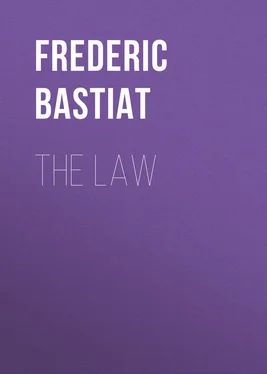Frédéric Bastiat - The Law
Здесь есть возможность читать онлайн «Frédéric Bastiat - The Law» — ознакомительный отрывок электронной книги совершенно бесплатно, а после прочтения отрывка купить полную версию. В некоторых случаях можно слушать аудио, скачать через торрент в формате fb2 и присутствует краткое содержание. Жанр: foreign_antique, foreign_prose, на английском языке. Описание произведения, (предисловие) а так же отзывы посетителей доступны на портале библиотеки ЛибКат.
- Название:The Law
- Автор:
- Жанр:
- Год:неизвестен
- ISBN:нет данных
- Рейтинг книги:5 / 5. Голосов: 1
-
Избранное:Добавить в избранное
- Отзывы:
-
Ваша оценка:
- 100
- 1
- 2
- 3
- 4
- 5
The Law: краткое содержание, описание и аннотация
Предлагаем к чтению аннотацию, описание, краткое содержание или предисловие (зависит от того, что написал сам автор книги «The Law»). Если вы не нашли необходимую информацию о книге — напишите в комментариях, мы постараемся отыскать её.
The Law — читать онлайн ознакомительный отрывок
Ниже представлен текст книги, разбитый по страницам. Система сохранения места последней прочитанной страницы, позволяет с удобством читать онлайн бесплатно книгу «The Law», без необходимости каждый раз заново искать на чём Вы остановились. Поставьте закладку, и сможете в любой момент перейти на страницу, на которой закончили чтение.
Интервал:
Закладка:
Frédéric Bastiat
The Law
FOREWORD
Anyone building a personal library of liberty must include in it a copy of Frédéric Bastiat's classic essay, "The Law." First published in 1850 by the great French economist and journalist, it is as clear a statement as has ever been made of the original American ideal of government, as proclaimed in the Declaration of Independence, that the main purpose of any government is the protection of the lives, liberties, and property of its citizens.
Bastiat believed that all human beings possessed the God-given, natural rights of "individuality, liberty, property." "This is man," he wrote. These "three gifts from God precede all human legislation." But even in his time – writing in the late 1840s – Bastiat was alarmed over how the law had been "perverted" into an instrument of what he called legal plunder. Far from protecting individual rights, the law was increasingly used to deprive one group of citizens of those rights for the benefit of another group, and especially for the benefit of the state itself. He condemned the legal plunder of protectionist tariffs, government subsidies of all kinds, progressive taxation, public schools, government "jobs" programs, minimum wage laws, welfare, usury laws, and more.
Bastiat's warnings of the dire effects of legal plunder are as relevant today as they were the day he first issued them. The system of legal plunder (which many now celebrate as "democracy") will erase from everyone's conscience, he wrote, the distinction between justice and injustice. The plundered classes will eventually figure out how to enter the political game and plunder their fellow man. Legislation will never be guided by any principles of justice, but only by brute political force.
The great French champion of liberty also forecast the corruption of education by the state. Those who held "government-endowed teaching positions," he wrote, would rarely criticize legal plunder lest their government endowments be ended.
The system of legal plunder would also greatly exaggerate the importance of politics in society. That would be a most unhealthy development as it would encourage even more citizens to seek to improve their own well-being not by producing goods and services for the marketplace but by plundering their fellow citizens through politics.
Bastiat was also wise enough to anticipate what modern economists call "rent seeking" and "rent avoidance" behavior. These two clumsy phrases refer, respectively, to the phenomena of lobbying for political favors (legal plunder), and of engaging in political activity directed at protecting oneself from being the victim of plunder seekers. (For example, the steel manufacturing industry lobbies for high tariffs on steel, whereas steel-using industries, like the automobile industry, can be expected to lobby against high tariffs on steel).
The reason why modem economists are concerned about "rent seeking" is the opportunity cost involved: the more time, effort and money that is spent by businesses on conniving to manipulate politics – merely transferring wealth – the less time is spent on producing goods and services, which increases wealth. Thus, legal plunder impoverishes the entire society despite the fact that a small (but politically influential) part of the society benefits from it.
It is remarkable, in reading "The Law," how perfectly accurate Bastiat was in describing the statists of his day which, it turns out, were not much different from the statists of today or any other day. The French "socialists" of Bastiat's day espoused doctrines that perverted charity, education, and morals, for one thing. True charity does not begin with the robbery of taxation, he pointed out. Government schooling is inevitably an exercise in statist brainwashing, not genuine education; and it is hardly "moral" for a large gang (government) to (legally) rob one segment of the population, keep most of the loot, and share a little of it with various "needy" individuals.
Socialists want "to play God," Bastiat observed, anticipating all the future tyrants and despots of the world who would try to remake the world in their image, whether that image would be communism, fascism, the "glorious union," or "global democracy." Bastiat also observed that socialists wanted forced conformity; rigid regimentation of the population through pervasive regulation; forced equality of wealth; and dictatorship. As such, they were the mortal enemies of liberty.
"Dictatorship" need not involve an actual dictator. All that was needed, said Bastiat, was "the laws," enacted by a Congress or a Parliament, that would achieve the same effect: forced conformity.
Bastiat was also wise to point out that the world has far too many "great men," "fathers of their countries," etc., who in reality are usually nothing but petty tyrants with a sick and compulsive desire to rule over others. The defenders of the free society should have a healthy disrespect for all such men.
Bastiat admired America and pointed to the America of 1850 as being as close as any society in the world to his ideal of a government that protected individual rights to life, liberty, and property. There were two major exeptions, however: the twin evils of slavery and protectionist tariffs.
Frédéric Bastiat died on Christmas Eve, 1850, and did not live to observe the convulsions that the America he admired so much would go through in the next fifteen years (and longer). It is unlikely that he would have considered the U.S. government's military invasion of the Southern states in 1861, the killing of some 300,000 citizens, and the bombing, burning, and plundering of the region's cities, towns, farms, and businesses as being consistent in any way with the protection of the lives, liberties and properties of those citizens as promised by the Declaration of Independence. Had he lived to see all of this, he most likely would have added "legal murder" to "legal plunder" as one of the two great sins of government. He would likely have viewed the post-war Republican Party, with its 50 percent average tariff rates, its massive corporate welfare schemes, and its 25-year campaign of genocide against the Plains Indians as first-rate plunderers and traitors to the American ideal.
In the latter pages of "The Law" Bastiat offers the sage advice that what was really needed was "a science of economics" that would explain the harmony (or lack thereof) of a free society (as opposed to socialism). He made a major contribution to this end himself with the publication of his book, Economic Harmonies , which can be construed as a precursor to the modern literature of the Austrian School of economics. There is no substitute for a solid understanding of the market order (and of the realities of politics) when it comes to combating the kinds of destructive socialistic schemes that plagued Bastiat's day as well as ours. Anyone who reads this great essay along with other free-market classics, such as Henry Hazlitt's Economics in One Lesson and Murray Roth-bard's Power and Market, will possess enough intellectual ammunition to debunk the socialist fantasies of this or any other day.
Thomas J. DiLorenzo May 2007
Thomas DiLorenzo is professor of economics at Loyola College in Maryland and a member of the senior faculty of the Mises Institute.
THE LAW 1 1 First published in 1850.
The law perverted! The law – and, in its wake, all the collective forces of the nation – the law, I say, not only diverted from its proper direction, but made to pursue one entirely contrary! The law become the tool of every kind of avarice, instead of being its check! The law guilty of that very iniquity which it was its mission to punish! Truly, this is a serious fact, if it exists, and one to which I feel bound to call the attention of my fellow citizens.
Читать дальшеИнтервал:
Закладка:
Похожие книги на «The Law»
Представляем Вашему вниманию похожие книги на «The Law» списком для выбора. Мы отобрали схожую по названию и смыслу литературу в надежде предоставить читателям больше вариантов отыскать новые, интересные, ещё непрочитанные произведения.
Обсуждение, отзывы о книге «The Law» и просто собственные мнения читателей. Оставьте ваши комментарии, напишите, что Вы думаете о произведении, его смысле или главных героях. Укажите что конкретно понравилось, а что нет, и почему Вы так считаете.












